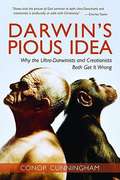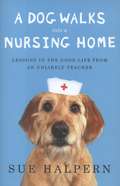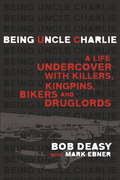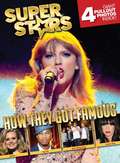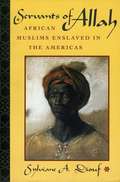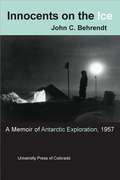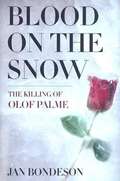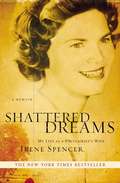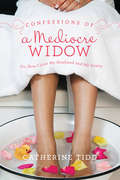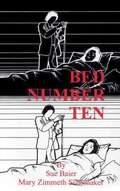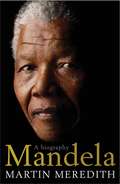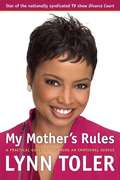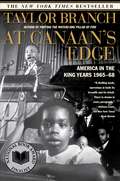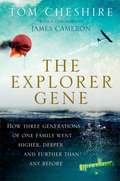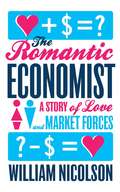- Table View
- List View
Saraband: The Memoirs of E.L. Mascall
by E. L. MascallIn this book, 87-year-old Anglo-Catholic theologian Eric Mascall writes entertainingly about his ancestry and infancy, school and university days, early teaching career and his decision to seek ordination, life in the universities at Lincoln and Oxford for 40 years, and his recent travels and pursuits.
Darwin's Pious Idea: Why the Ultra-Darwinists and Creationists Both Get It Wrong
by Conor CunninghamIn "Darwin's Pious Idea," Cunningham puts forth a compelling, cutting-edge case for both creation and evolution, drawing skillfully on an array of philosophical, theological, historical, and scientific sources to buttress his arguments.
Ready, Aim, Fire!: The Real Adventures of Annie Oakley
by Ellen LevineThis book is a biography of the famous sharpshooter who toured the country in Buffalo Bill's Wild West Show.
A Dog Walks into a Nursing Home: Lessons in the Good Life from an Unlikely Teacher
by Sue HalpernA layabout mutt turned therapy dog leads her owner to a new understanding of the good life. At loose ends with her daughter leaving home and her husband on the road, Halpern decides to give herself and Pransky, her Labradoodle, a new lease on life by getting certified as a therapy dog team.
Being Uncle Charlie
by Bob DeasyBeing Uncle Charlie is the intense, intimate and graphic story of one Canadian undercover cop who spent two decades infiltrating organized crime. From Russian and Italian mafias to notorious biker gangs, Bob Deasy gained access to and the acceptance of criminals who most cops in any country would never encounter or arrest, let alone befriend.Bob Deasy had an illustrious twenty-three year career with the Ontario Provincial Police. Using little more than his quick wits, natural confidence and a deft mental equilibrium that allowed him to stay three chess moves ahead of his quarry, Deasy was the secret weapon behind some of the signature crime busts in Canadian history. Infiltrating the Outlaws Motorcycle Club and the Russian and Italian mobs, he also single-handedly set up international import-export businesses, faked contract hit jobs and executed one of the largest drug buys in OPP history. He also perfected the now controversial "Mr. Big" technique of posing as a crime kingpin to solicit unwitting confessions from suspects in long-dormant cold murder cases--a tactic he defends as he practised it, and with which he enjoyed a 100% success rate.Being Uncle Charlie is a nail-biting ride--sometimes comic, always entertaining--that reads like a one-man history of modern crime, told through the ground-level, insider's perspective of a cop who was able to blend in with the unsavoury, the desperate and the diabolical.
Superstars: How They Got Famous
by Downtown Bookworks Inc.Even the biggest supernovae of the celebrity universe began small, dreaming big. Their stories will be the riveting subject of RISE "How Your Favorite Celebs Became Famous." Sure, die-hard fans may know some of the facts, but RISE will collect in one keepsake volume the treasured tales of these young stars' early beginnings, as well as show us fantastic up-to-the-minute pics of their current looks and successes.
The Opening Doors: My Child's First Eight Years Without Sight
by Lois T. HendersonIn the early 1950's, the author couldn't find books about blind children, so she wrote about her own son. Through a mother's eyes, we follow the growth of this new family as they learn, along with Davey, how to function in the sighted world.
Representational Style in Congress
by Justin GrimmerThis book demonstrates the consequences of legislators' strategic communication for representation in American politics. Representational Style in Congress shows how legislators present their work to cultivate constituent support. Using a massive new data set of texts from legislators and new statistical techniques to analyze the texts, this book provides comprehensive measures of what legislators say to constituents and explains why legislators adopt these styles. Using the new measures, Justin Grimmer shows how legislators affect how constituents evaluate their representatives and the consequences of strategic statements for political discourse. The introduction of new statistical techniques for political texts allows a more comprehensive and systematic analysis of what legislators say and why it matters than was previously possible. Using these new techniques, the book makes the compelling case that to understand political representation, we must understand what legislators say to constituents.
Warlords, Strongman Governors, and the State in Afghanistan
by Dipali MukhopadhyayWarlords have come to represent enemies of peace, security, and 'good governance' in the collective intellectual imagination. This book asserts that not all warlords are created equal. Under certain conditions, some become effective governors on behalf of the state. This provocative argument is based on extensive fieldwork in Afghanistan, where Mukhopadhyay examined warlord-governors who have served as valuable exponents of the Karzai regime in its struggle to assert control over key segments of the countryside. She explores the complex ecosystems that came to constitute provincial political life after 2001 and exposes the rise of 'strongman' governance in two provinces. While this brand of governance falls far short of international expectations, its emergence reflects the reassertion of the Afghan state in material and symbolic terms that deserve our attention. This book pushes past canonical views of warlordism and state building to consider the logic of the weak state as it has arisen in challenging, conflict-ridden societies like Afghanistan.
Servants of Allah: African Muslims Enslaved in the Americas
by Sylviane A. DioufExplores the stories of African Muslim slaves in the New World. The author argues that although Islam as brought by the Africans did not outlive the last slaves, "what they wrote on the sands of the plantations is a successful story of strength, resilience, courage, pride, and dignity. " She discusses Christian Europeans, African Muslims, the Atlantic slave trade, literacy, revolts, and the Muslim legacy. Annotation copyrighted by Book News, Inc. , Portland, OR
Innocents on the Ice
by John C. BehrendtIn 1956, John C. Behrendt had just earned his master's degree in geophysics and obtained a position as an assistant seismologist in the International Geophysical Year glaciological program. He sailed from Davisville, Rhode Island to spend eighteen months in Antarctica with the IGY expedition as part of a U.S. Navy-supported scientific expedition to establish Ellsworth Station on the Filchner Ice Shelf. Innocents on the Ice is a memoir based on Behrendt's handwritten journals, looking back on his daily entries describing his life and activities on the most isolated of the seven U.S. Antarctic stations. Nine civilians and thirty Navy men lived beneath the snow together, and intense personal conflicts arose during the dark Antarctic winter of 1957. Little outside contact was available to ease the tension, with no mail delivery and only occasional radio contact with families back home. The author describes the emotional stress of the living situation, along with details of his parties' explorations of the Filchner-Ronne Ice Shelf system during the summers of 1957 and 1958. Along the hazardous 1,300-mile traverse in two Sno-Cats, the field party measured ice thickness and snow accumulation as part of an international effort to determine the balance of the Antarctic ice sheet, and made the first geological observations of the spectacular Dufek Massif in the then-unexplored Pensacola Mountains. Behrendt also draws upon his forty years of continual participation in Antarctic research to explain the changes in scientific activities and environmental awareness in Antarctica today. Including photos, maps, and a glossary identifying various forms of ice, Innocents on the Ice is a fascinating combination of the diary of a young graduate student and the reflections of the accomplished scientist he became.
Blood On The Snow
by Jan BondesonThe Swedish Prime Minister Olof Palme, a major figure in world politics and an ardent opponent of apartheid, was shot dead on the streets of Stockholm in February 1986. At the time of his death, Palme was deeply involved in Middle East diplomacy and was working under UN auspices to end the Iran-Iraq war. Across Scandinavia, Palme's killing had an impact similar to that of the Kennedy assassinations in the United States--and it ignited nearly as many conspiracy theories. Interest in the Palme slaying was most recently stirred by reports of the death of Christer Pettersson, who was tried for the murder twice, convicted the first time, and then acquitted on appeal. In his investigative account of Palme's still-unsolved murder, the historian Jan Bondeson meticulously recreates the assassination and its aftermath. Like the best works of crime fiction, this book puts the victim and his death into social context. Bondeson's work, however, is noteworthy for its dispassionate treatment of police incompetence: the police did not answer a witness's phone call reporting the murder just 45 seconds after it occurred, and further time was lost as the police sought to confirm that someone had actually been shot. When the police arrived on the scene, they did not even recognize the victim as the Prime Minister. This early confusion was emblematic of the errors that were to follow. Bondeson demolishes the various conspiracy theories that have been devised to make sense of the killing, before suggesting a convincing explanation of his own. A brilliant piece of investigative journalism, Blood on the Snow includes crime-scene photographs and reconstructions that have never before been published and offers a gripping narrative of a crime that shocked a continent.
Shattered Dreams: My Life as a Polygamist's Wife
by Irene SpencerIrene Spencer did as she felt God commanded in marrying her brother-in-law Verlan LeBaron, becoming his second wife. When the government raided the fundamentalist, polygamous Mormon village of Short Creek, Arizona, Irene and her family fled to Verlan's brothers' Mexican ranch. They lived in squalor and desolate conditions in the Mexican desert with Verlan's six brothers, one sister, and numerous wives and children. Readers will be appalled and astonished, but most amazingly, greatly inspired. Irene's dramatic story reveals how far religion can be stretched and abused and how one woman and her children found their way out, into truth and redemption.
Shared Visions
by John HeilbrunnSome specific books about individual persons and their experiences, achievements and struggles have emerged occasionally, but very few books have been published where a number of persons with a visual impairment tell their stories and paint a picture of their lives. Shared Visions contains 16 interviews with persons who are blind or have low vision from all continents of the world including Australia, Fiji, Iceland, Japan and Rwanda. The interviews depict the individual differences from one person to the other, but also show certain communalities and demonstrate the strong will and preparedness to struggle to fulfill dreams and participate in the fight for the improvement of conditions for visually impaired persons nationally and internationally. Shared Visions is edited by John Heilbrunn,Vice-President of Danish Association of the Blind, Denmark, as a tribute to brave and dedicated persons within the blindness movement around the World and a celebration of the 100 year anniversary of the organization.
Thendral: Vol. 14, Issue 02 January 2014
by MadhurabharathiThis issue features interviews with Arun Ramanathan and Ira. Murugan; three recipes; Biographical sketch of Sivakkavimani C.K. subramanya Mudaliar; an article on Srivanjiam Sri Vanjinathar Temple; three short stories; an article on novelist Javert Sitaraman and excerpts from his novel “Udal Porul Aanandhi” plus usual features of Thendral Pesukirathu; Anbulla Snehitiye; Kathiravanai Kelungal; Nalam Vaazha; Kavithai Pandhal, Ilanthendral, etc.
It's Not as Bad as it Sounds (My Life with MS & Fibro)
by Yvonne DecelisA memoir of a life with MS and fibromyalgia.
Confessions of a Mediocre Widow
by Catherine TiddI spent my 11th wedding anniversary planning my husband's funeral. If I could just figure out how to make that rhyme, it would be the beginning of a great country song. Involuntarily single. That's the true story of where Catherine Tidd finds herself just three weeks after turning thirty-one. Widowed with three children under six years old, a rusty resume, no fix-it skills, and no clue how to live life as a widow, Catherine can't help but be a little exasperated with her dead husband for leaving her to deal with life on her own. Catherine's now in charge of her life in a way she never wanted to be, in a way that would have most of us reeling and numb. But she soon realizes that when you call the shots, you can make pedicures one of the stages of grief--and that moving forward might be more fun in a new sports car. Her honest Confessions of a Mediocre Widow is a glimpse into the heartbreaking and sometimes humorous world of a young woman who learns that it is possible to find joy in an unexpected life.
Bed Number Ten
by Sue Baier Mary Zimmeth SchomakerA patient's personal view of long term care. Seen through the eyes of a patient totally paralyzed with Guillain-Barre syndrome, this moving book takes you through the psychological and physical pain of an eleven month hospital stay. BED NUMBER TEN reads like a compelling novel, but is entirely factual. You will meet: The ICU staff who learned to communicate with the paralyzed woman - and those who did not bother. The physicians whose visits left her baffled about her own case. The staff and physicians who spoke to her and others who did not recognize her presence. The nurse who tucked Sue tightly under the covers, unaware that she was soaking with perspiration. The nurse who took the time to feed her drop by drop, as she slowly learned how to swallow again. The physical therapist who could read her eyes and spurred her on to move again as if the battle were his own. In these pages, which reveal the caring, the heroism, and the insensitivity sometimes found in the health care fields, you may even meet people you know.
From Death-Camp to Existentialism: A Psychiatrist's Path to a New Therapy
by Viktor E. FranklIn this book, Dr. Frankl explains the experience which led to his discovery of logotherapy.
Ralph Waldo Emerson in Context
by Wesley T. MottThis collection of newly commissioned essays maps the vital contextual backgrounds to Ralph Waldo Emerson's life and work. The volume begins with a detailed chronology of Emerson's life and publishing history, setting the stage for a wide-ranging discussion of his geographic and environmental contexts from early and later life, including his travels and intellectual encounters with the United States, Europe, and Asia. It goes on to survey the intellectual terrain of the nineteenth century, exploring Emerson's relationship with key philosophical, aesthetic, theological, scientific, familial, social, and political contexts and issues. Finally, it assesses the popular and critical receptions that have solidified Emerson's legacy as a towering figure in American literature, criticism, and culture today. Fans, students, and scholars will turn to this reference time and again for a fuller understanding of this seminal American writer.
Mandela
by Martin MeredithNelson Mandela stands out as one of the most admired political figures of the twentieth century. It was his leadership and moral courage above all that helped to deliver a peaceful end to apartheid in South Africa after years of racial division and violence and to establish a fledgling democracy there. Martin Meredith’s vivid portrayal of this towering leader was originally acclaimed as "an exemplary work of biography: instructive, illuminating, as well as felicitously written” (Kirkus Reviews), providing "new insights on the man and his time” (Washington Post). Now Meredith has revisited and significantly updated his biography to incorporate a decade of additional perspective and hindsight on the man and his legacy and to examine how far his hopes for the new South Africa have been realised. Published as South Africa celebrates 100 years since its founding and hosts the 2010 World Cup,Nelson Mandelais the most thorough and up-to-date account available of the life of its most revered hero.
My Mother's Rules: A Practical Guide to Becoming an Emotional Genius
by Lynn TolerAutobiography of Judge Lynn Toler describing her sometimes difficult upbringing and the life-lessons she learned from her mother.
At Canaan's Edge: America in the King Years, 1965-68
by Taylor Branch<P>At Canaan's Edge concludes America in the King Years, a three-volume history that will endure as a masterpiece of storytelling on American race, violence, and democracy. Pulitzer Prize-winner and bestselling author Taylor Branch makes clear in this magisterial account of the civil rights movement that Martin Luther King, Jr., earned a place next to James Madison and Abraham Lincoln in the pantheon of American history. <P>In At Canaan's Edge, King and his movement stand at the zenith of America's defining story, one decade into an epic struggle for the promises of democracy. Branch opens with the authorities' violent suppression of a voting-rights march in Alabama on March 7, 1965. The quest to cross Selma's Edmund Pettus Bridge engages the conscience of the world, strains the civil rights coalition, and embroils King in negotiations with all three branches of the U.S. government. <P>The marches from Selma coincide with the first landing of large U.S. combat units in South Vietnam. The escalation of the war severs the cooperation of King and President Lyndon Johnson after a collaboration that culminated in the landmark 1965 Voting Rights Act. <P>After Selma, young pilgrims led by Stokely Carmichael take the movement into adjacent Lowndes County, Alabama, where not a single member of the black majority has tried to vote in the twentieth century. Freedom workers are murdered, but sharecroppers learn to read, dare to vote, and build their own political party. Carmichael leaves in frustration to proclaim his famous black power doctrine, taking the local panther ballot symbol to become an icon of armed rebellion. <P>Also after Selma, King takes nonviolence into Northern urban ghettoes. Integrated marches through Chicago expose hatreds and fears no less virulent than the Mississippi Klan's, but King's 1966 settlement with Mayor Richard Daley does not gain the kind of national response that generated victories from Birmingham and Selma. We watch King overrule his advisers to bring all his eloquence into dissent from the Vietnam War. We watch King make an embattled decision to concentrate his next campaign on a positive compact to address poverty. <P>We reach Memphis, the garbage workers' strike, and King's assassination. Parting the Waters provided an unsurpassed portrait of King's rise to greatness, beginning with the 1955 Montgomery bus boycott and ending with the assassination of President John F. Kennedy in 1963. In Pillar of Fire, theologians and college students braved the dangerous Mississippi Freedom Summer of 1964 as Malcolm X raised a militant new voice for racial separatism. <P>The Civil Rights Act of 1964 outlawed segregation by race and mandated equal opportunity for women. From the pinnacle of winning the Nobel Peace Prize, King willed himself back to "the valley" of jail in his daunting Selma campaign. At Canaan's Edge portrays King at the height of his moral power even as his worldly power is waning. It shows why his fidelity to freedom and nonviolence makes him a defining figure long beyond his brilliant life and violent end.
The Explorer Gene: How Three Generations of One Family Went Higher, Deeper, and Further Than Any Before
by Thomas CheshireOn May 27, 1931, Auguste Piccard became the first human to enter the stratosphere, flying an experimental balloon he invented himself. Thirty years later, his son Jacques went to the bottom of the earth, descending to the Mariana Trench in a submarine built by him and Auguste. To this day, no one has gone deeper. Bertrand, the third generation, was the first person to fly around the world non-stop in a balloon. Now, he's building his own craft: a solar-powered plane to circumnavigate the globe. In "The Explorer Gene," Tom Cheshire asks how three generations of one family achieved such extraordinary feats, often with the consensus against them. None of the Piccards set out to explore: Auguste was a physicist, Jacques an economist and Bertrand a psychiatrist. Was it fate, a famous family name - or their explorer gene?
The Romantic Economist
by William NicolsonA wise and humorous memoir about a young economist trying to apply the rules of the market to his own floundering dating life. "I know that this sounds like a bit of a cliché, but really, it's not you..." The woman who said this to William Nicolson was funny, talented and unbearably beautiful. His mother said he ought to marry that girl. And he lost her in a personal best time of six weeks. It was when he found himself being dumped like this yet again that he decided something had to be done. William is an economist, which means he's good at reducing an infinitely complex world into a set of clear, rational principles about the way people and markets behave. Unfortunately, he has never been able to replicate this in the world of romance. Girls confuse him; they're the very definition of infinite complexity. In this book, he sets out to apply the rules of economics to his shaky love life. For a time, everything seems to be clearer. Want to play hard to get? Reduce your supply. Want a girlfriend? Find an undervalued asset. Why are all the good ones taken? That'll be the Efficient Market Hypothesis. But things don't work out quite as he'd hoped, and he's more isolated than ever. Can he find the perfect economic theory to rescue him from a future of lonely nights, or is the dating game too intricate to be won by logical, rational thinking?

